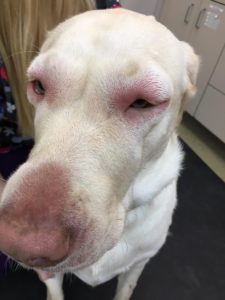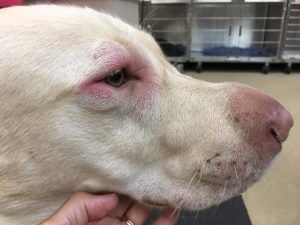Allergies are overreactions of the immune system to substances known as allergens. A wide range of symptoms including skin irritation and respiratory problems can develop when a pet’s body tries to rid itself of allergens. Allergies are common in cats, dogs and other pets.
Causes of Allergies
Pets can suffer from three main types of allergies: food allergies, environmental allergies, and flea allergy dermatitis (FAD).
Food allergies are allergic reactions to food ingredients. They are often difficult to identify as a pet’s body can develop sensitivities to ingredients that have previously been well tolerated.
Environmental allergies are reactions to a wide range of allergens in the environment. These can include outdoor allergens such as grass and pollen or indoor irritants like mold, household cleaning products, or dust mites.
Flea allergy dermatitis (FAD) is a reaction to flea saliva. This type of allergy can cause extreme itching and discomfort in affected pets.
Symptoms of Allergies
Please visit your veterinarian if your pet displays any of the following common allergy symptoms so they can be correctly diagnosed and treated.
- Sneezing
- Coughing
- Itchiness
- Redness and skin irritation
- Inflammation of the eyes
- Ear infections
- Vomiting
- Diarrhea
- Lethargy
Diagnosis of Allergies
Your veterinarian will look at your pet’s medical history and ask you a series of questions to discover more about the onset of symptoms. They will then perform a physical examination to check for signs of allergies such as skin irritation and inflammation.
Tests will be performed to narrow down the cause of your pet’s allergic reaction if it cannot be easily identified. These may include blood and intradermal skin tests that can indicate whether or not your pet is allergic to a specific allergen. If food allergies are suspected, your veterinarian may recommend an elimination diet to determine which ingredients your pet’s body is reacting to.
Treatment of Allergies
If the cause of your pet’s allergy is identified, it may be possible to reduce or eliminate symptoms by removing allergens from their environment. Your veterinarian will advise you on the best strategy for achieving this. If the underlying cause cannot be conclusively diagnosed, treatment will usually focus on relieving a pet’s symptoms.
Your veterinarian may prescribe medications to reduce allergy symptoms. Modern allergy drugs include Apoquel and Cytopoint which work in different ways to control the immune system’s response to allergic reactions.
Other medications used to treat allergies include antihistamines like Benadryl which blocks the production of histamine to minimize allergy symptoms. Medications such as Temaril-P combine antihistamines with corticosteroids, a class of drug used to reduce inflammation.
Please be aware that dose requirements for pets are usually higher than for people. For this reason, it is very important to follow your veterinarian’s advice closely when administering allergy medications.
Prevention of Allergies
The best way to protect your pet from allergies is by preventing them from coming into contact with allergens whenever possible. Choose a healthy, balanced diet made with high-quality ingredients and keep your pet away from chemicals and other irritants. It’s also important to protect against fleas and other parasites. Please ask your veterinarian for further advice on minimizing the risk of your pet developing allergies.



